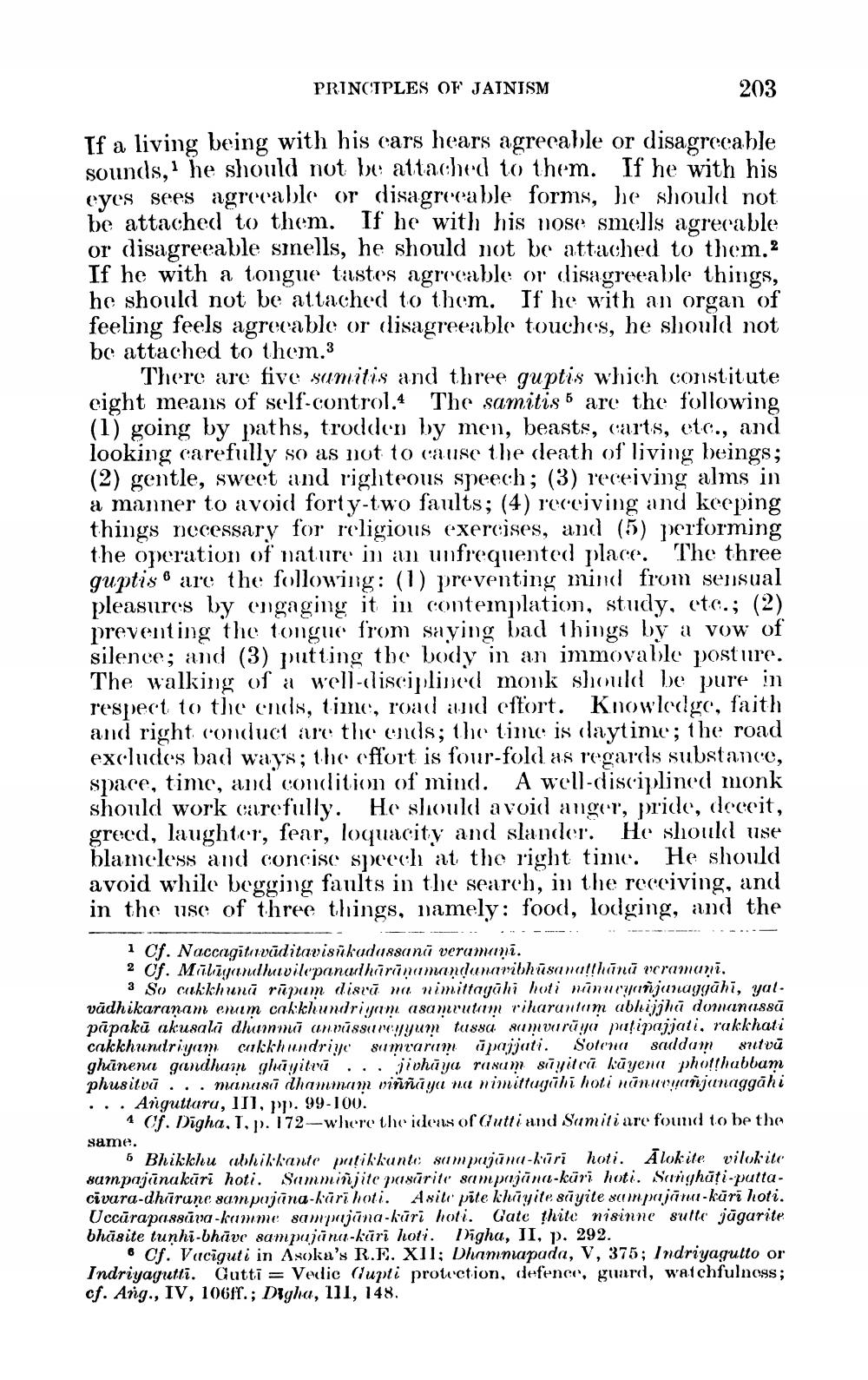________________
PRINCIPLES OF JAINISM
203
If a living being with his ears hears agreeable or disagreeable sounds,' he should not be attached to them. If he with his eyes sees agreeable or disagreeable forms, he should not be attached to them. If he with his nose smells agrecable or disagreeable smells, he should not be attached to them.2 If he with a tongue tastes agreeable or disagreeable things, he should not be attached to them. If he with an organ of feeling feels agreeable or disagreeable touches, he should not be attached to them.3
There are five samitis and three guptis which constitute eight means of self-control.4 The samitis 6 are the following (1) going by paths, trodden by men, beasts, carts, etc., and looking carefully so as not to cause the death of living beings; (2) gentle, sweet and righteous speech; (3) receiving al a manner to avoid forty-two faults; (4) receiving and keeping things necessary for religious exercises, and (5) performing the operation of nature in an unfrequented place. The three guptis o are the following: (1) preventing mind from sensual pleasures by engaging it in contemplation, study, etc.; (2) preventing the tongue from saying bad things by a vow of silence; and (3) putting the body in an immovable posture. The walking of a well-ilisciplined monk should be pure in respect to the ends, time, road and effort. Knowledge, faith and right conduct are the onds; the time is daytime; the road excludes bad ways; the effort is four-fold as regards substance, space, time, and condition of mind. A well-disciplined monk should work carefully. He should avoid anger, pride, deceit, greed, laughter, fear, loquacity and slander. He should use blameless and concise speech at the right time. He should avoid while begging faults in the search, in the receiving, and in the use of three things, namely: food, lodging, and the
1 Cf. Naccagitanvāditavisükudassanü veramani. 2 Cf. Milyarndhuvilepanathiri namundunaribhusawa!!hānī vcramuni.
3 So cukkhund ripam distū na wimittagūhi hoti nanu cynjunuggāhi, yal. vādhikaranam enim cakkhundriyam asamrutom riharantum abhijjhů domanassā pāpakū akusali dhammi anvussureyyum tussa samvuruya palipajjati, rakkhati cakkhundriyam cakkhundriye sumuar m ūpajjati. Sotenii sauldam sutvu ghanena gandhain gha yitir ...jivhuyu rasum sivilcī kūyenı phofthabbam phusitvū... manasii dhammam vinnuyu na nimittugihi hoti nuntajanaggahi ... Anguttaru, 111, pp. 99-100.
1. Of. Digha, 1, p. 172-where the ideas of Cutti and Samiti are found to be the same.
6 Bhikkhu abhikkante patikkunto sam pajūna-kari hoti. Alokite vilokite sampajinakūri hoti. Samminjite pasirite samo pajana-kūri hoti. Sanghāti-puttacīvara-dhirunc sam pajana-kari hoti. Asile pite khayite sūyite san pajana-kūri hoti. Uccūrapassara-kamme sampūna-kūri hoti. Gate thite nisinne sulle jūgarite bhăsite tunhi-bhāve sampujana-kūri hoti. Digha, II, p. 292.
6 Cf. Vaciguti in Asoka's R.E. XII; Dhammapada, V, 375; Indriyagutto or Indriyagutti. Cutti = Vedic Clupti protection, defence, guard, watchfulness; cf. Ang., IV, 106ff.; Digha, 111, 148.




